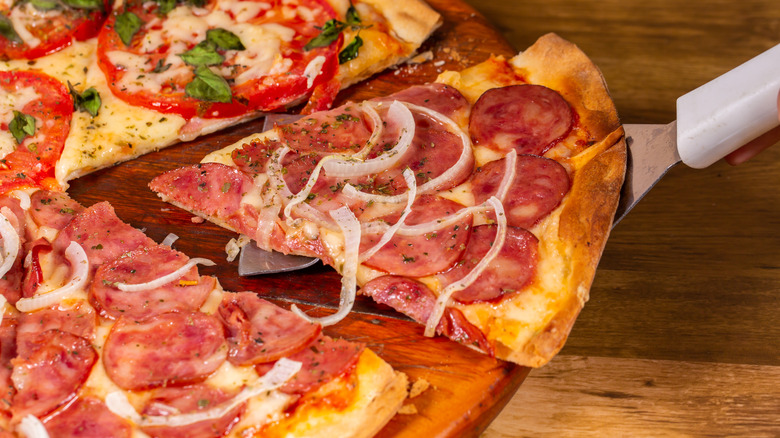The Science Behind Why Pizza Tastes Better Cold
There's no food more divisive than cold pizza. The cool round of crust dolloped with tomato sauce and re-solidified mozzarella — complete with an array of perfectly chilled toppings — is a snack often reached for by busy college students and eclectic pizza fans alike. Yet, the leftover delicacy is loathed by many who decry the non-traditional serving method. After all, pizza is a dish intended to be served hot. So, why wait for the hot pie to cool down before enjoying it?
Many cold pizza devotees swear by the treat, often favoring it over hot, fresh pizza. And those leftover pizza fans might just be onto something, as there is real science behind the delicious qualities of cold pizza. For one, pizza contains many aromatic ingredients — such as garlic and onions — which add to both the flavor and aroma of the food, creating a more layered flavor profile. And these aromatics only improve over time. So, while your pie is sitting in the fridge overnight, those flavors are melding and becoming much more complex, leading to a far more delicious pizza.
Additionally, cold pizza is less likely to be greasy. Since cold temperatures help keep the fats in pizza solid, you don't have to deal with an oily mess. Meanwhile, the cold temperatures help to amplify certain flavors (such as saltiness) while dulling sour tastes, which makes cold pizza an extra indulgent and savory delight. So, next time you order pizza — maybe from one of the best pizza places in the U.S. — you might want to put it on ice.
All about the aromatics
When it comes to the reasoning behind why cold pizza tastes so good, aromatics are so important to consider. They are the basis of many dishes — from curries to sauces and soups — and can include herbs, vegetables, and even meat. However, the most popular aromatics are onions and garlic. Most recipes for pizza sauce include a base of onions and garlic that are sautéed together before the addition of tomatoes. These ingredients serve as the canvas for the pizza's flavor and are only enhanced by cheese and toppings.
But if you think that sautéing is what activates aromatics to their fullest potential, then you should try refrigerating them. Yes, eating your pizza the next day — perhaps even straight out of the fridge — can help to further accentuate the flavors in your sauce. This is because, with time, aromatic ingredients mellow out and combine with other flavors in your dish, producing a much more cohesive flavor. Cold pizza can help to quiet some flavors that might overshadow the aromatics since your tongue is less likely to pick up sweet and bitter flavors when your food is cold. This means that your tomato-sauced pizza won't taste too sweet when it's straight from the fridge. Additionally, taste receptors for saltiness are enhanced when food is cold, so your pizza will pack an extra savory punch, especially if it includes salty toppings like pepperoni or ham.
Keeping cheese solid and crust crispy
However, it's not just the sauce that benefits from refrigeration. The crust and the cheese can actually improve in the cold as well, especially if you're not a fan of sloppy pizza. This is because pizza can keep its structure better in the cold. The cold also prevents your cheese from melting in your sauce and crust, keeping each layer of the pie perfectly distinct. Since the oils and cheese on your pizza congeal in colder temperatures, it keeps them from seeping into other layers, giving your pizza more structural integrity.
This applies to the crust of your pizza, too. The oils from the baked pizza dough will solidify in the refrigerator, preventing a greasy crust. The pie crust will also become firmer once it's removed from the fridge. Since refrigerating bread leads to the recrystallization of the starches, it speeds up the process of the bread becoming stale. So, if kept in the fridge for extended periods, that cold crust might become a bit tough to eat. But if it's eaten the next day, refrigeration should act as a simple way to firm up your pizza, creating an almost entirely new and distinct dish from the hot version.
So, whether or not you think that pizza — like revenge — is a dish best served cold, you might want to give the chilled alternative a try. You might be surprised at just how delicious cold pizza is.


